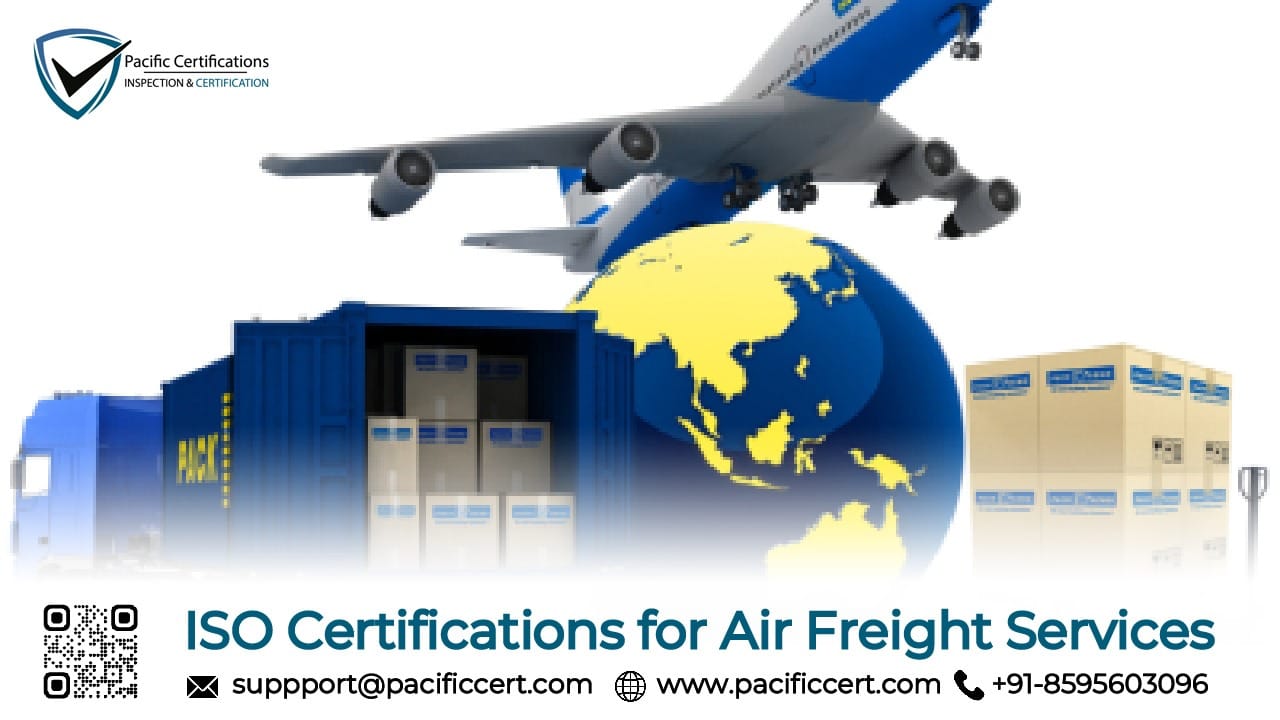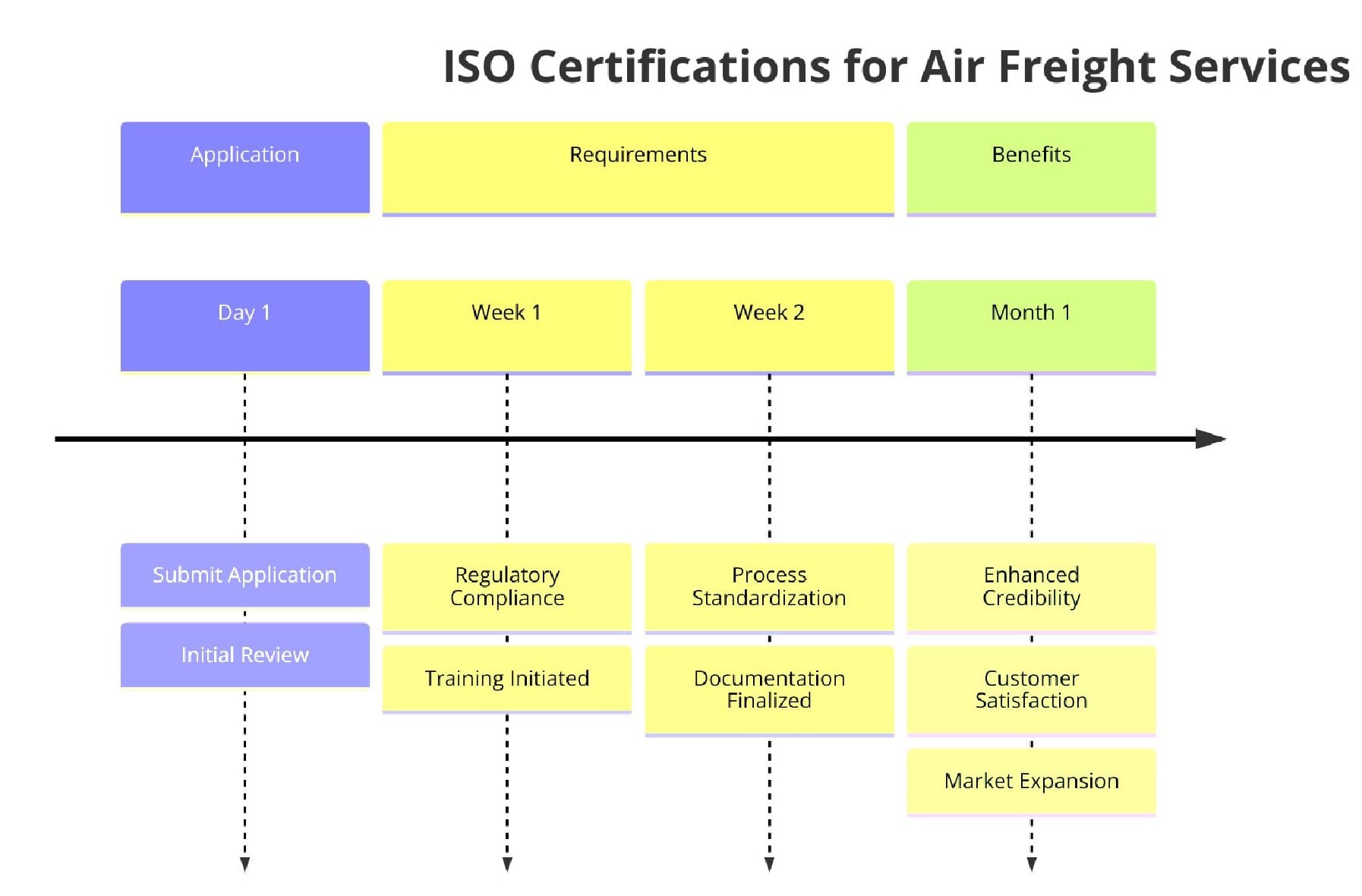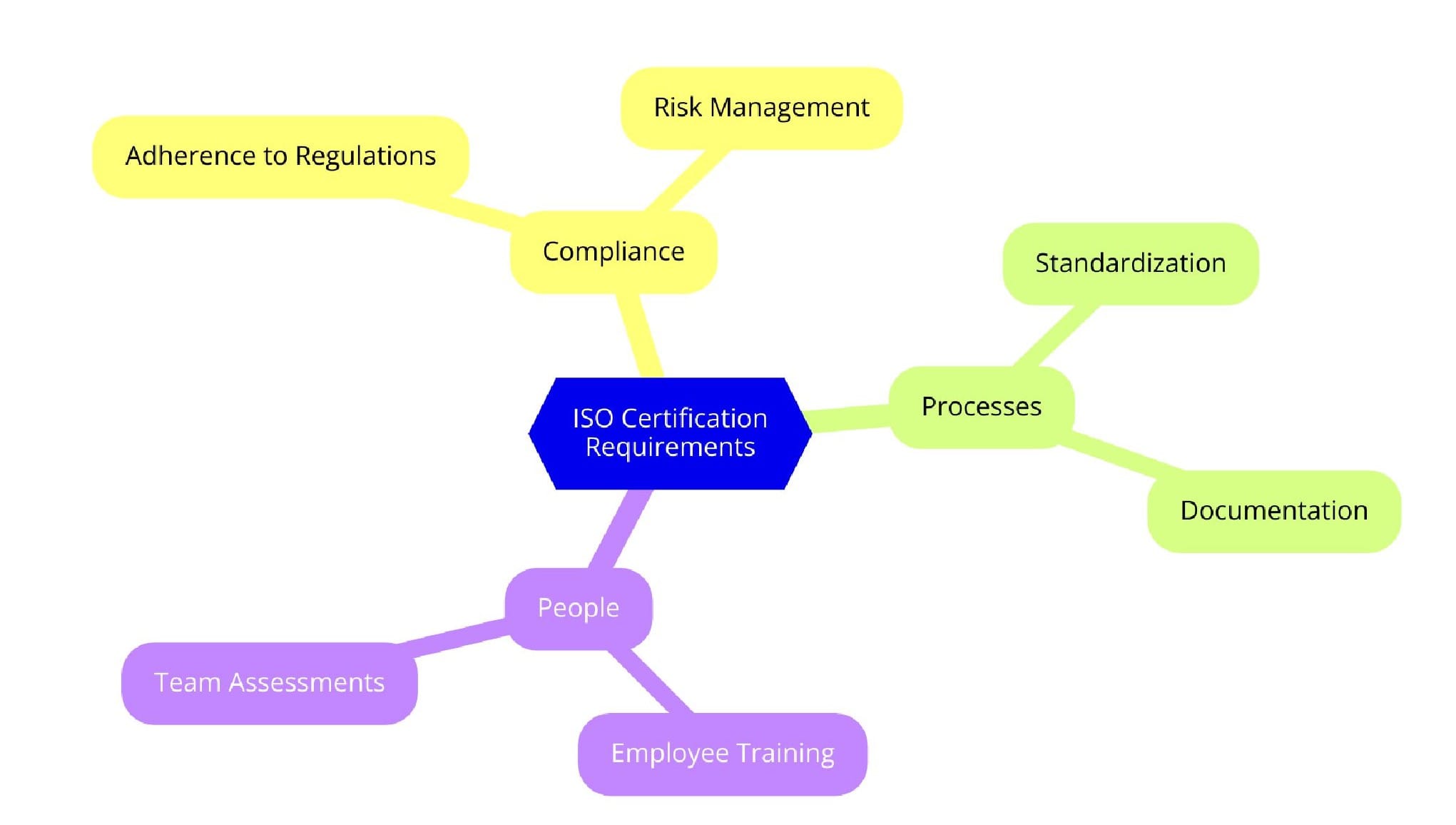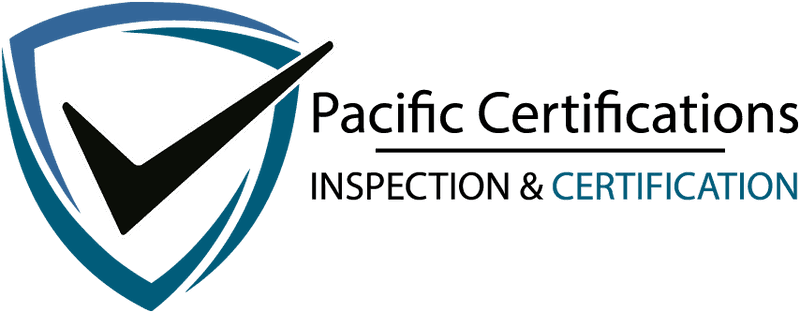ISO Certifications for Air Freight Services Businesses, Requirements and Benefits

Introduction to ISO Standards for Air Freight Services
Air freight services are a critical component of the global supply chain, ensuring goods are transported quickly and safely across borders. To meet the demands of quality, safety and efficiency, ISO certifications for air freight services play a pivotal role. These certifications not only enhance operational processes but also build trust with clients and stakeholders.
ISO standards are internationally recognized frameworks developed to ensure consistent quality, safety and efficiency in various industries. For air freight services, adhering to these standards helps maintain seamless operations in a sector heavily reliant on precision and compliance with regulatory requirements.
ISO certifications, such as ISO 9001 for quality management and ISO 14001 for environmental management, provide air freight service providers with a structured approach to meeting customer expectations while addressing environmental and safety concerns.

In the competitive world of logistics, obtaining ISO certifications signifies a company’s commitment to excellence and continuous improvement. These standards ensure alignment with global best practices, opening doors to new markets and partnerships.
If your air freight business aims to achieve ISO certification, we are here to guide you. Reach out at [email protected] or call +91-8595603096 to start your certification journey.
Applicable ISO Standards for Air Freight Services
Several ISO standards are directly applicable to air freight services, addressing key aspects such as quality, environmental responsibility, information security, and occupational health and safety.
ISO 9001: Quality Management Systems
ISO 9001 is one of the most widely adopted standards globally. It focuses on improving customer satisfaction, streamlining processes, and enhancing operational efficiency. For air freight services, it ensures the timely and safe delivery of goods with minimal errors.
ISO 14001: Environmental Management Systems
This standard addresses the environmental impact of business operations. Air freight services, with their dependency on fuel and energy, benefit from ISO 14001 by adopting sustainable practices and reducing carbon emissions.
ISO 45001: Occupational Health and Safety
Worker safety is paramount in air freight operations. ISO 45001 ensures a safe working environment, reducing risks and enhancing employee well-being.
ISO 28000: Security Management Systems for the Supply Chain
Supply chain security is a critical aspect of air freight. ISO 28000 focuses on minimizing security risks, ensuring the protection of goods, and fostering trust in international trade.
ISO 27001: Information Security Management Systems
In today’s digital age, protecting customer and business data is crucial. ISO 27001 ensures robust information security measures, safeguarding sensitive data from breaches and cyberattacks.
ISO 31000: Risk Management
This standard offers guidelines for risk management, helping air freight companies identify, analyze, and mitigate risks effectively.
Click here to find out more applicable standards to your industry
Pacific Certifications is your trusted partner in achieving ISO certifications for air freight services. We specialize in conducting audits and issuing certifications tailored to your needs.
With a team of experienced professionals, Pacific Certifications ensures a seamless certification process, enabling your business to align with international standards. We focus on empowering air freight companies to enhance their processes, comply with regulations, and build credibility in the market.
Navigating the ISO certification process can be seamless with Pacific Certifications. Email [email protected] or call us at +91-8595603096 to get started.
Requirements of ISO Certifications for Air Freight Services
Each ISO standard applicable to air freight services has specific requirements tailored to enhance quality, safety, environmental responsibility and security. Below, we break down the key requirements for each standard:

ISO 9001: Quality Management Systems Requirements
- Customer Focus: Understand and meet customer requirements, enhancing satisfaction and loyalty.
- Leadership Commitment: Demonstrate leadership involvement in maintaining quality management principles.
- Process Approach: Adopt a systematic approach to manage processes efficiently and effectively.
- Risk-Based Thinking: Identify and address risks and opportunities related to quality objectives.
- Continuous Improvement: Implement mechanisms for ongoing enhancements in quality processes.
- Performance Evaluation: Monitor and evaluate the effectiveness of processes and quality management systems.
ISO 14001: Environmental Management Systems Requirements
- Environmental Policy: Develop and document an environmental policy aligned with organizational goals.
- Environmental Aspects and Impacts: Identify environmental impacts and implement controls to minimize negative effects.
- Legal and Regulatory Compliance: Ensure compliance with applicable environmental laws and regulations.
- Operational Controls: Implement measures to manage activities affecting the environment, such as waste and emissions.
- Monitoring and Measurement: Track environmental performance and report progress toward sustainability goals.
ISO 45001: Occupational Health and Safety Requirements
- Risk Identification and Assessment: Identify workplace hazards and assess risks to employee health and safety.
- Incident Management: Establish procedures to report, investigate, and address workplace incidents.
- Safety Training: Provide employees with training on occupational health and safety protocols.
- Emergency Preparedness: Develop and maintain procedures for handling emergencies effectively.
- Continuous Improvement: Monitor and improve safety measures to reduce risks and enhance worker protection.
ISO 28000: Security Management Systems for the Supply Chain Requirements
- Risk Assessment: Evaluate potential security risks in the supply chain and implement mitigation measures.
- Security Planning: Develop security policies and objectives tailored to supply chain operations.
- Incident Management: Establish protocols to detect, respond to, and recover from security breaches.
- Compliance with Regulations: Adhere to international and local supply chain security standards.
- Performance Monitoring: Regularly assess and improve the effectiveness of the security management system.
ISO 27001: Information Security Management Systems Requirements
- Information Security Policies: Define and document policies to manage and secure sensitive information.
- Risk Management: Identify and address risks related to information security.
- Access Controls: Implement measures to control access to sensitive data and systems.
- Incident Management: Establish a framework for managing and mitigating data breaches or security incidents.
- Continuous Monitoring: Conduct regular audits to ensure the ongoing effectiveness of information security measures.
ISO 31000: Risk Management Requirements
- Establishing the Context: Define the scope and criteria for risk management aligned with organizational objectives.
- Risk Identification: Identify risks that could impact the organization’s operations or goals.
- Risk Analysis: Assess the likelihood and impact of identified risks.
- Risk Evaluation: Prioritize risks based on their severity and implement necessary controls.
- Risk Treatment: Develop strategies to mitigate, transfer, or accept risks effectively.
- Monitoring and Review: Continuously review and improve the risk management framework.
These requirements ensure that air freight companies can operate efficiently, comply with global standards and maintain stakeholder confidence. By systematically addressing these areas, organizations are well-prepared to meet industry challenges while delivering superior services.
Streamline your certification process with experts. Write to [email protected] or call +91-8595603096 for personalized support.
Benefits of ISO Certifications for Air Freight Services
Adopting ISO certifications delivers numerous benefits, positioning air freight companies for sustained success.

Customer Confidence:
ISO certifications demonstrate a commitment to quality, safety, and reliability, building trust with clients and partners.
Operational Efficiency:
By standardizing processes, companies can minimize delays, reduce errors, and optimize resource utilization.
Compliance:
ISO standards help businesses adhere to international regulations, avoiding fines and legal complications.
Risk Management:
Effective risk management ensures smooth operations even in challenging situations, safeguarding business continuity.
Market:
Certified companies gain a competitive edge, attracting more customers and securing long-term contracts.
Sustainability:
ISO 14001 certification highlights a company’s commitment to reducing its environmental footprint, aligning with global sustainability goals.
Conclusion
In this year, the air freight industry is witnessing significant advancements in technology and sustainability practices. With the rising emphasis on green logistics, ISO 14001 has gained prominence among air freight companies aiming to meet global climate targets.
According to market research, digital transformation is revolutionizing supply chain management, with ISO 27001 playing a crucial role in securing data in an increasingly interconnected ecosystem. As businesses continue to navigate complexities in global trade, ISO standards are more relevant than ever in ensuring resilience and competitiveness.
Contact Us
Ready to elevate your air freight services to international standards? Partner with Pacific Certifications to achieve ISO certifications tailored to your business needs. Let us help you build trust, streamline operations, and enhance market credibility.
Pacific Certifications is accredited by ABIS, in case you need support with ISO certification for your Air Freight Services business, please contact us at [email protected] or +91-8595603096.
Read More at: Blogs by Pacific Certifications

